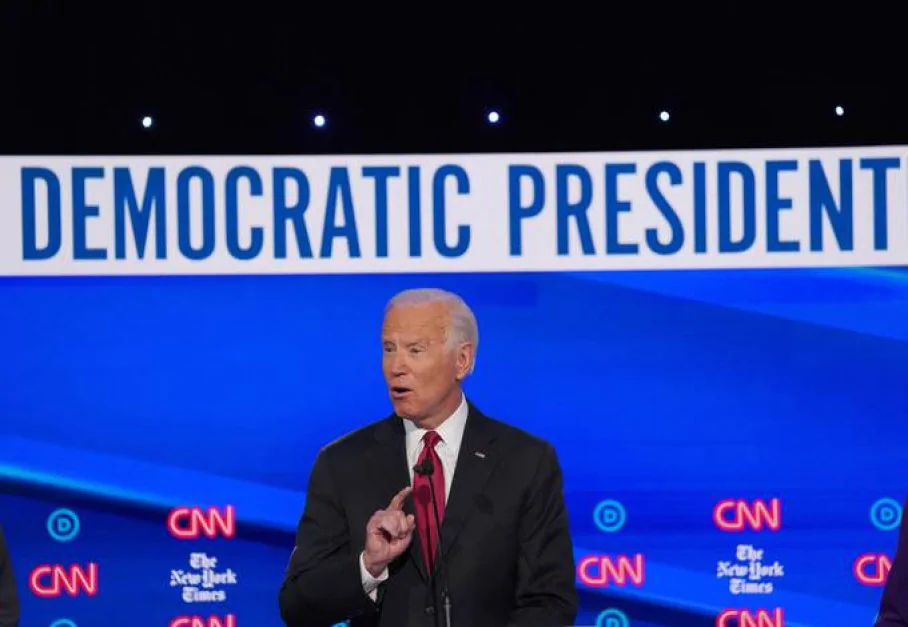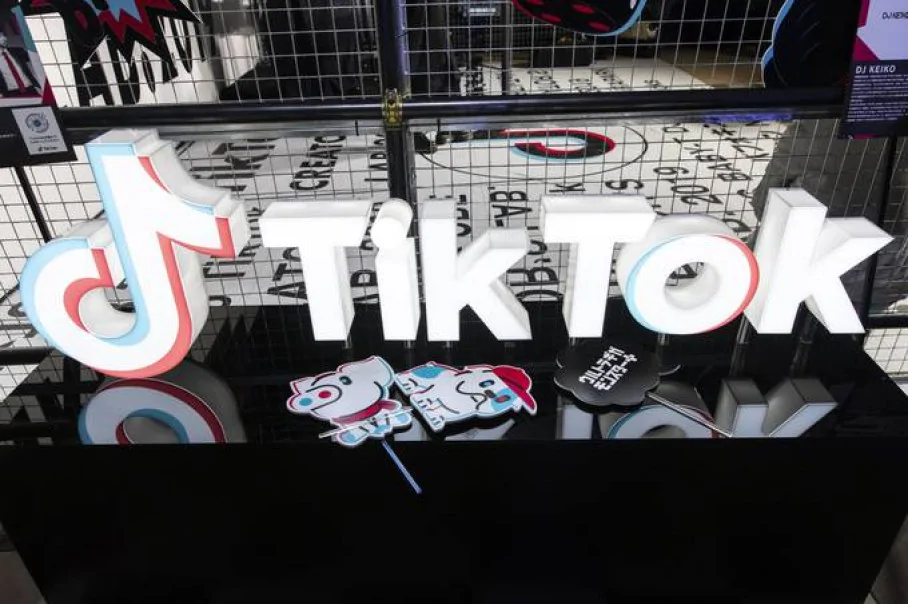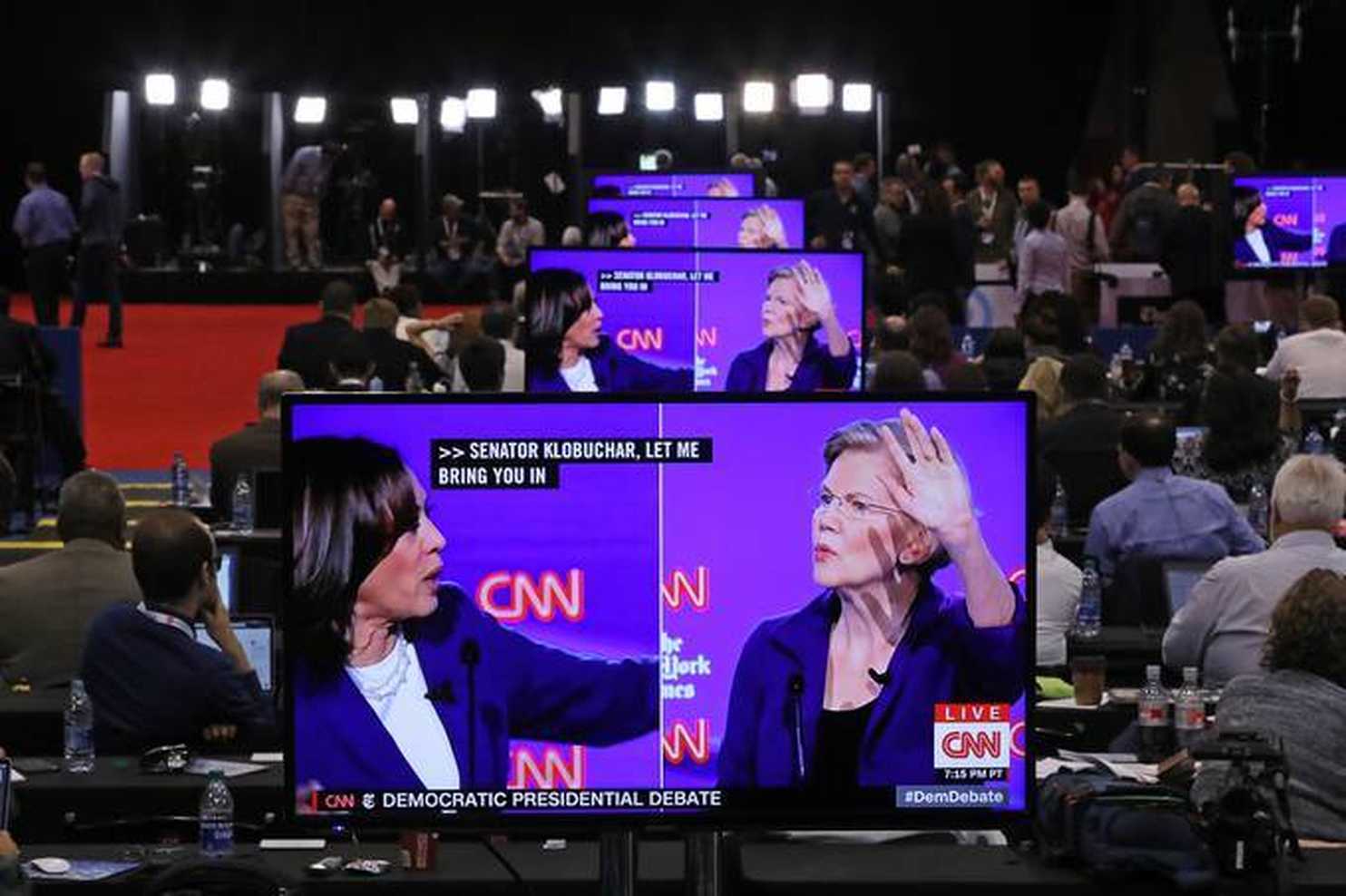Sens. Kamala Harris (D-Calif.) and Elizabeth Warren (D-Mass.) debated whether Twitter should officially boot President Trump from its platform. (Photo by Chip Somodevilla/Getty Images)
Ctrl + N
Democratic rifts over policing Silicon Valley were on vivid display during last night’s Ohio debate, with antitrust issues and President Trump’s abundant use of Twitter taking center stage.
Sen. Kamala Harris (D-Calif.) pressed Sen. Elizabeth Warren (D-Mass.), who is leading in many polls, to join her in calling on Twitter to suspend Trump’s account for tweets she argued obstruct justice or incite violence, just hours after the company defended its policy of preserving newsworthy tweets that would otherwise violate its policy. Warren wouldn’t agree to the challenge, prompting Harris to take a swipe at the core of Warren’s messaging and suggest she has a double standard on corporate accountability.
“You can’t say you’re for corporate responsibility if it doesn’t apply to everyone,” Harris said.
Warren hit back by touting her recent pledge to turn down contributions over $200 from executives at large tech companies as many 2020 Democratic candidates — including Harris — have been aggressively fundraising in Silicon Valley.
“You can’t go behind closed doors and take the money of these executives and then turn around and expect that these are the people who are actually finally going to enforce the laws,” Warren said.
Tech issues got more air time last night than in any preceding Democratic face-off. The Democratic jabs at Facebook, Google, Amazon and Twitter were the clearest sign yet that the party’s romance with Silicon Valley is waning. But the exchanges also underscored the lack of consensus among Democrats about a regulatory approach amid broad agreement tech companies have too much power, endanger consumers’ privacy and did not do enough to protect U.S. elections in 2016.
Warren’s plan to break up Facebook, Google and Amazon has emerged as the buzziest tech proposal on the campaign trail. But other Democrats don’t think antitrust action will solve the tech industry’s challenges — and as Warren surges in the polls, they did more to highlight those distinctions onstage last night.
“As usual, Senator Warren is 100% right in diagnosing the problem,” said Andrew Yang, a New York-based tech entrepreneur who has garnered attention in Silicon Valley for his positions on automation. “But we also have to be realistic that competition doesn’t solve all the problems. It’s not like any of us wants to use the fourth best navigation app. That would be like cruel and unusual punishment. There is a reason why no one is using Bing today. Sorry, Microsoft.”
Yang said politicians need to focus on the issues facing the tech industry and come up with new solutions. He said antitrust action would amount to using 20th century tools to address 21st century problems. Later in the debate, Yang highlighted his support for a so-called “data dividend,” which would ensure consumers own their digital data and are paid for it.
Former Texas congressman Beto O’Rourke raised questions about whether it’s appropriate for the commander-in-chief to call for the breakup of individual companies.
“And we will be unafraid to break up big businesses if we have to do that, but I don’t think it is the role of a president or a candidate for the presidency to specifically call out which companies will be broken up,” O’Rourke said. “That’s something that Donald Trump has done, in part because he sees enemies in the press and wants to diminish their power. It’s not something that we should do.”
O’Rourke said if elected, he would treat the companies as publishers. O’Rourke has previously proposed making changes to a key Internet law shielding tech platforms from liability for the content others post on their sites, covered by Section 230 of the Communications Decency Act. He attacked Facebook’s recent decision to run a Trump campaign ad that made false claims.
“They curate the content that we see. Our pictures and personal information that they share with others, we would allow no publisher to do what Facebook is doing, to publish that ad that Senator Warren has rightfully called out, that CNN has refused to air because it is untrue and tells lies about the vice president, treat them like the publisher that they are,” he said.
Meanwhile, Sen. Amy Klobuchar (D-Minn.), who is the top Democrat on the Senate antitrust subcommittee, said there’s a “startup slump” in the U.S.. She has previously introduced legislation to modernize antitrust laws and provide more resources to regulatory agencies charged with enforcing the laws.
“I have the lead legislation, which means, one, changing the standard so we can do a better job of doing just what we’ve been talking about here, is breaking down some of this consolidation, and also making sure that the enforcers have the resources to take them on because they’re so overwhelmed,” she said.
But as tech regulation played a bigger role on the debate stage, some are questioning whether it’s an issue that can move the needle with voters — especially during a general election. Wealthy activist Tom Steyer said he supports breaking up or regulating monopolies but questioned whether that is where Democrats should be focusing their attention.
“But we have to understand that Mr. Trump is going to be running on the economy,” he said. “We’re going to have to show the American people that we don’t just know how to tax and have programs to break up companies but also talk about prosperity, talk about investing in the American people, talk about harnessing the innovation and competition of the American private sector.”
Tom Nichols, a professor, wrote on Twitter that Steyer wasn’t wrong, and he wondered if tech antitrust is an issue that would help Democrats secure votes. From Twitter:
Tom Steyer wasn’t wrong there. Talking about tech breakups isn’t a thing for 2020. It’s important, needs to be done, but this isn’t the thing that gets you to 270.#DemDebate
— Tom Nichols (@RadioFreeTom) October 16, 2019
BITS, NIBBLES AND BYTES

Democratic presidential candidate and former vice president Joe Biden speaks during the fourth U.S. Democratic presidential candidates’ debate Oct. 15. (Shannon Stapleton/Reuters)
BITS: Facebook decided not to fact check political ads, but it continue to haphazardly block those that violate a number of other advertising policies, such as using profanity, Ryan Mac and Zahra Hirji at BuzzFeed News report.
While Democrats continue to slam Facebook for its decision to not send political candidates’ ads to fact-checkers, they’ve endured the brunt of the company’s seemingly random enforcement of other advertising policies, Ryan and Zahra report. Of the 160 ads taken down this month, 117 belonged to former vice president Joe Biden. President Trump, Sen. Bernie Sanders (I-Vt.), Warren and Steyer also had ads removed.
The most common reason for ad removal was that the images used had “nonexistent functionality,” or in most cases, contained images of buttons that looked interactive but were not. At least one ad was removed for use of profanity.
“None of these political ads were rejected on the basis of being deemed false by our fact-checkers,” Facebook told BuzzFeed News. “They were removed for violating one or more of Facebook’s other advertising policies, such as our policy against using fake buttons in ads.”
But BuzzFeed found that application of the policy has been inconsistent and that dozens of similar Biden ads remained up. Facebook removed 32 more Biden ads flagged by BuzzFeed after reporters reached out.
“Evidently Facebook views our graphic design choices as a greater threat to American democracy than Donald Trump’s obscene lies,” Biden representative TJ Ducklo told BuzzFeed News. “They gladly profit off of these proven falsehoods, no matter the cost to our national discourse.”

A sign at the TikTok Creator’s Lab 2019 event hosted by Bytedance Ltd. in Tokyo in February. (Shiho Fukada/Bloomberg News)
NIBBLES: TikTok is trying to get ahead of growing criticism from Washington by adding two former U.S. lawmakers to its content moderation team.
Former congressman Jeff Denham (R-Calif.) and congressman Bart Gordon (D-Tenn.) will be part of a team from law firm K&L Gates assisting the Chinese-owned firm to create a committee to “review content moderation policies covering a wide range of topics, including child safety, hate speech, [and] misinformation” and “further increase transparency around our content moderation policies and the practices we employ to protect our community,” TikTok U.S. general manager Vanessa Pappas wrote in a news release.
Social media companies are under more pressure than ever before in Washington, but TikTok’s Chinese ownership has raised additional concerns that the company is employing Beijing-mandated censorship abroad. Last week Sen. Marco Rubio (R-Fla.) called for the U.S. government to investigate the company for national security concerns.
As recently as May, TikTok’s global content-moderation guidelines banned criticism of the Chinese government, according to a report from Guardian. TikTok says the guidelines are no longer in use and that local teams shape content moderation guidelines, but has declined to say what those are in the United States. But as my colleague Tony Romm points out, TikTok’s announcement does little to clarify what the company’s moderation policies are.
we have been trying for many weeks to get TikTok to talk about its rules and standards for content. here’s a blog post that raises more questions than answers https://t.co/MER16OdlgR
— Tony Romm (@TonyRomm) October 15, 2019

A child holds an Apple iPhone 6S. (Kiichiro Sato/AP)
BYTES: Teens are outsmarting Apple’s army of engineers to get around Screen Time, a built-in tool that gives parents control of how much time kids spend on their phones, my colleague Reed Albergotti reports. Some experts are accusing Apple of luring parents seeking to limit their kids’ screen time into a false sense of security.
Teens use a host of tricks to get around the feature: downloading software meant to exploit Apple security flaws, cracking their parents’ passwords or manipulating bugs in the tool. For instance, teens get around restrictions on watching YouTube by watching it via iMessage. One mother found her 14-year-old son could make Screen Time stop working by repeatedly turning the phone on and off . Apple acknowledged in a customer service chat that her son had found a known bug, but didn’t tell her if it planned to fix it.
“These are not rocket science, backdoor, dark web sort of hacks,” says Chris McKenna, founder of the Internet safety group Protect Young Eyes. “It blows me away that Apple hasn’t thought through the fact that a persistent middle school boy or girl can bang around and find them.” McKenna argues that Apple, with its large profits and expertise, should be able to put a stop to the long list of loopholes. Other experts alleged that Apple limits the functionality of other apps that might provide parents an alternative means of controlling their children’s device use.
Apple spokeswoman Michele Wyman told Reed in a statement that Apple is “committed to providing our users with powerful tools to manage their iOS devices and [is] always working to make them even better.” Wyman did not comment on specific bugs and workarounds or the speed at which Apple fixes them.
PUBLIC CLOUD
— News from the public sector:
PRIVATE CLOUD
— News from the private sector:
%2Farc-anglerfish-washpost-prod-washpost%2FXCK3L6HPRQI6TO362IBG5YGBTE.jpg&w=480&h=320)
Amazon.com Inc. is reaching into its deep pockets in an effort to make Seattle more business-friendly, pledging an additional $1 million to a corporate-backed group ahead of next month’s contentious city council elections.
Bloomberg
FAST FWD
— News about tech workforce and culture:
— Tech news generating buzz around the Web:
@MENTIONS
- Jimmy Asci, WeWork’s chief communications officer, resigned last Wednesday Bloomberg reports.
- Information Technology and Innovation Foundation Senior Policy Analyst Alan McQuinn is leaving to work as Professional Staff Member for the House Science Committee.
CHECK-INS
— Today:
— Coming up:
WIRED IN
It’s never been easier to avoid walking. A cargo-carrying robot might change that, my colleague Peter Holley reports.















